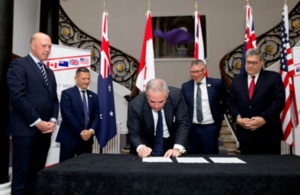Attorneys General lead international cooperation to combat cybercrime

Attorney General Geoffrey Cox QC MP signing the Statement surrounded by (from right to left) the Attorney General of the USA, Attorney General of New Zealand, Associate Deputy Minister of Canada and Minister of Home Affairs for Australia.
At a meeting held in London, the Quintet signed a statement reaffirming their support of the Council of Europe Convention on Cybercrime – also known as the Budapest Convention – as a strong, legally-binding framework to combat cybercrime.
The statement also supports the Open-Ended Intergovernmental Expert Group on Cybercrime (IEG), the United Nations forum in which substantive experts gather to discuss responses to cybercrime, and is best placed to take account of a comprehensive set of viewpoints and possible solutions on the subject of cybercrime. The IEG will produce recommendations on cybercrime to the United Nations Commission on Crime Prevention and Criminal Justice (Commission) in 2021.
The Quintet also discussed a range of shared issues affecting their various jurisdictions including corporate criminal liability, sentencing frameworks, hostile state activity, social media and data privacy issues and the use of artificial intelligence to improve efficiency in the legal system.
Commenting on the meeting, UK Attorney General, Geoffrey Cox QC MP, said:
The Quintet is bound by a respect for human rights, fundamental freedoms, democracy and the rule of law. We also share a common concern about the evolution and complexity of challenges posed by cybercrime.
International cooperation is vital in the fight against cybercrime and my Quintet counterparts and I believe the Council of Europe Convention on Cybercrime (Budapest Convention) is the best means to do this. We hope that our statement sends a clear message: we stand united in our efforts to tackle this threat.
Last updated 1 August 2019 + show all updates
- Added link to Quintet communiqué.
- First published.
